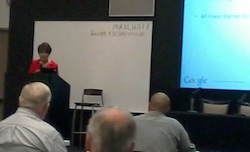Silicon Valley congresswoman Ann Eschoo wants to shake up the way that Washington manages and assigns spectrum. The goal is to free up a total of 500 MHz for wireless communications purposes. Much of that would come from turning over frequencies held by government agencies to public use. But some of it would come, willingly or not, from the private sector.

“We have to make freeing up spectrum a top priority,” she said at Joint Venture Silicon Valley's second annual wireless symposium, held on 2 November 2012 at Marvell Semiconductor Inc. headquarters in Santa Clara. “So many companies and broadcasters think it belongs to them. We know that the airways belong to the American people.”
Eschoo pointed to an FCC decision to move ahead with buying back television channel assignments from broadcasters on a voluntary basis and auctioning it off to wireless carriers. She said it would account for 120 MHz towards the final goal, and raise $25 billion dollars, although some of that would go to broadcasters who gave up their channel assignments.
The FCC has given itself a June 2014 deadline to hold the auctions. There are a lot of different interests to balance in the process. Wireless Internet service providers are worried that unlicensed frequencies will be sold out from underneath them.
Spectrum policy “must be balanced with both licensed and unlicensed spectrum,” Eschoo said, adding that wireless technology generates $50 billion in revenue in the U.S. every year.
Some government agencies are fighting plans to clear them off of some frequencies and turn the bandwidth over to the private sector, preferring instead to work out some way of sharing. But that idea is not very popular with wireless broadband advocates.
Eschoo believes that federal agencies can be more efficient in their use of frequencies, and wants Congress to step in and “scrub” the way the executive branch holds and uses spectrum. The bottom line, she said, is that the airwaves are an engine for job creation.
